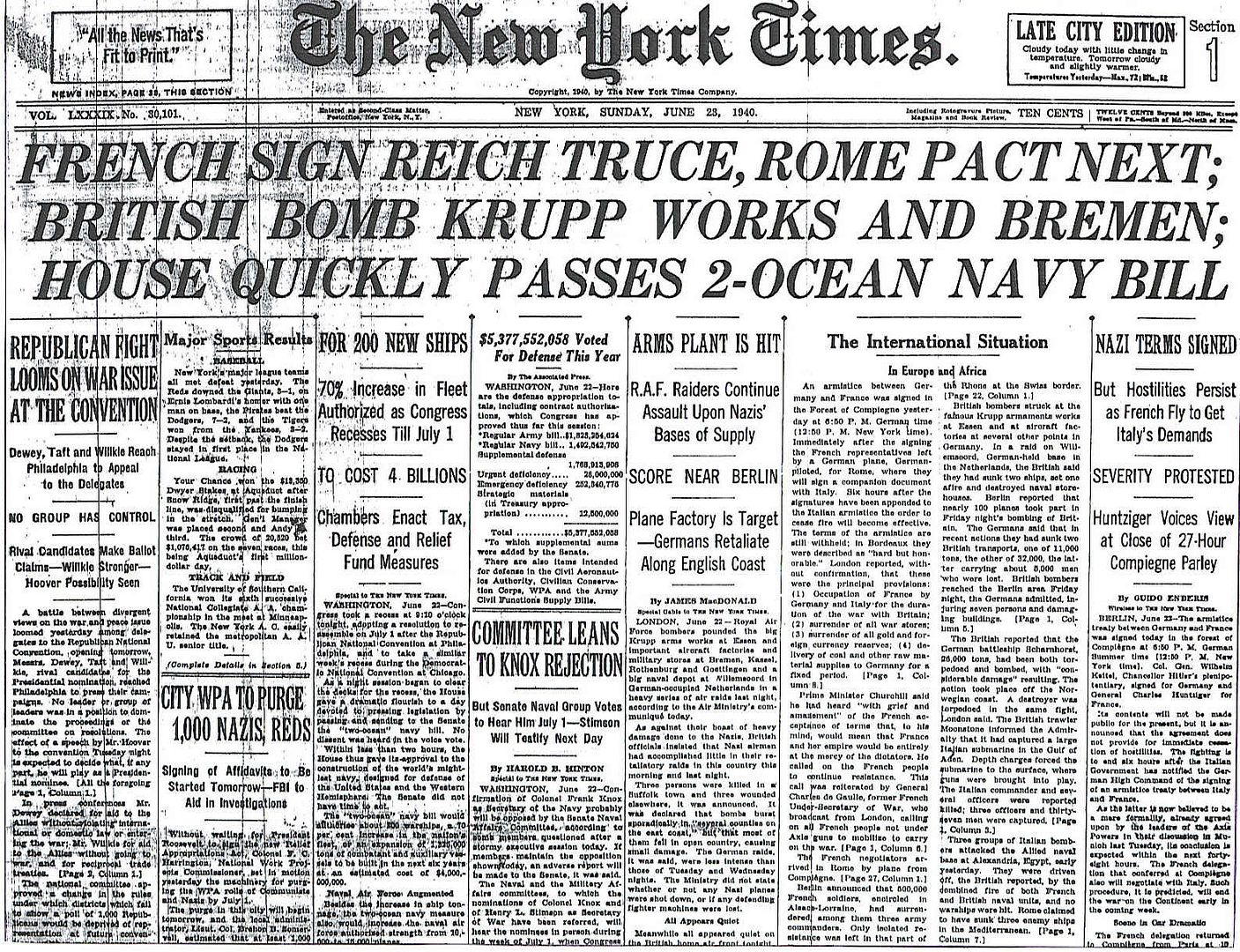
Posted on 06/23/2010 5:07:25 AM PDT by Homer_J_Simpson

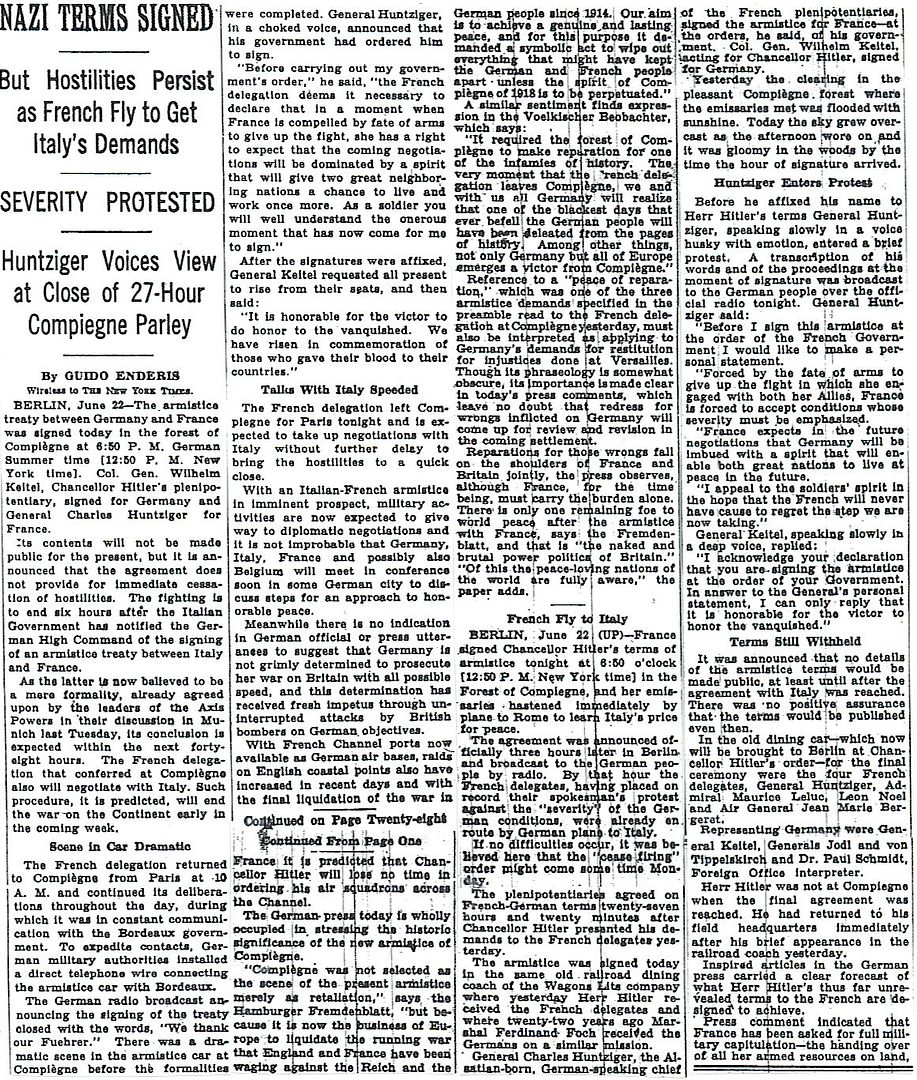
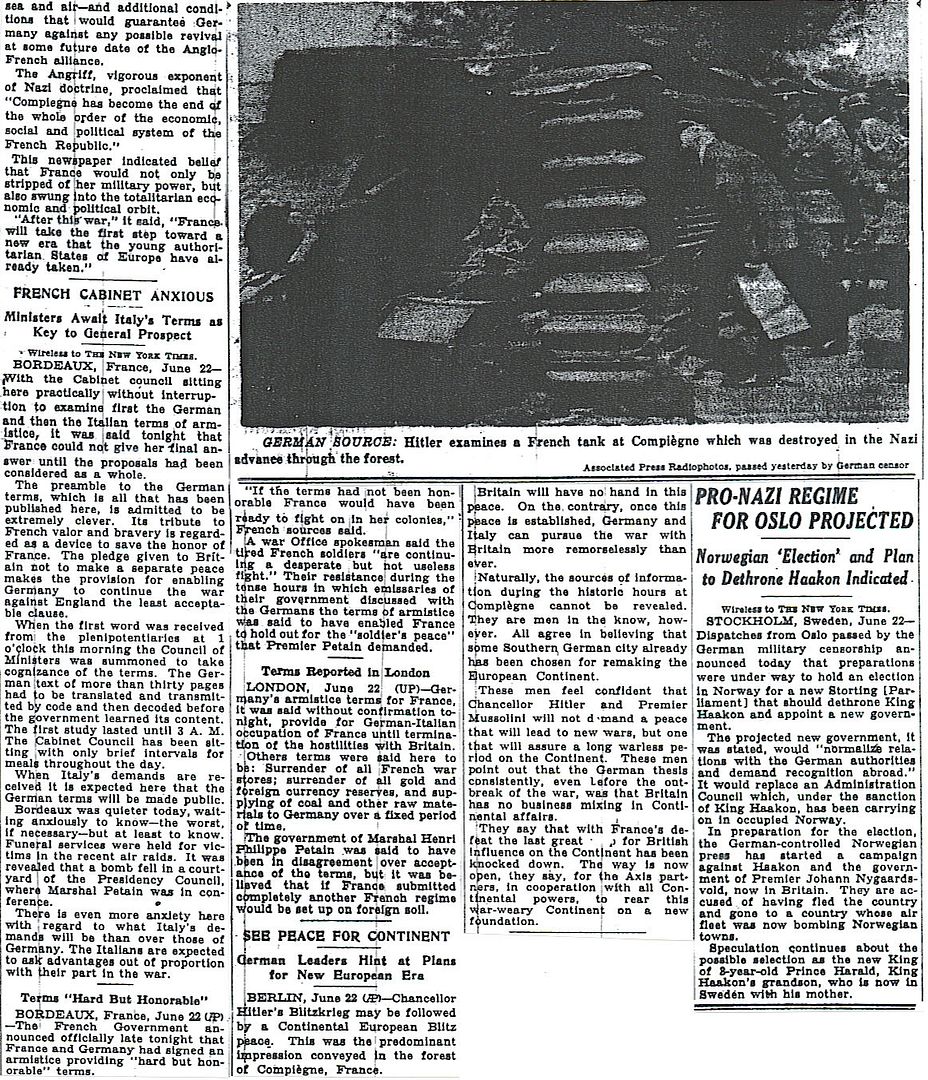
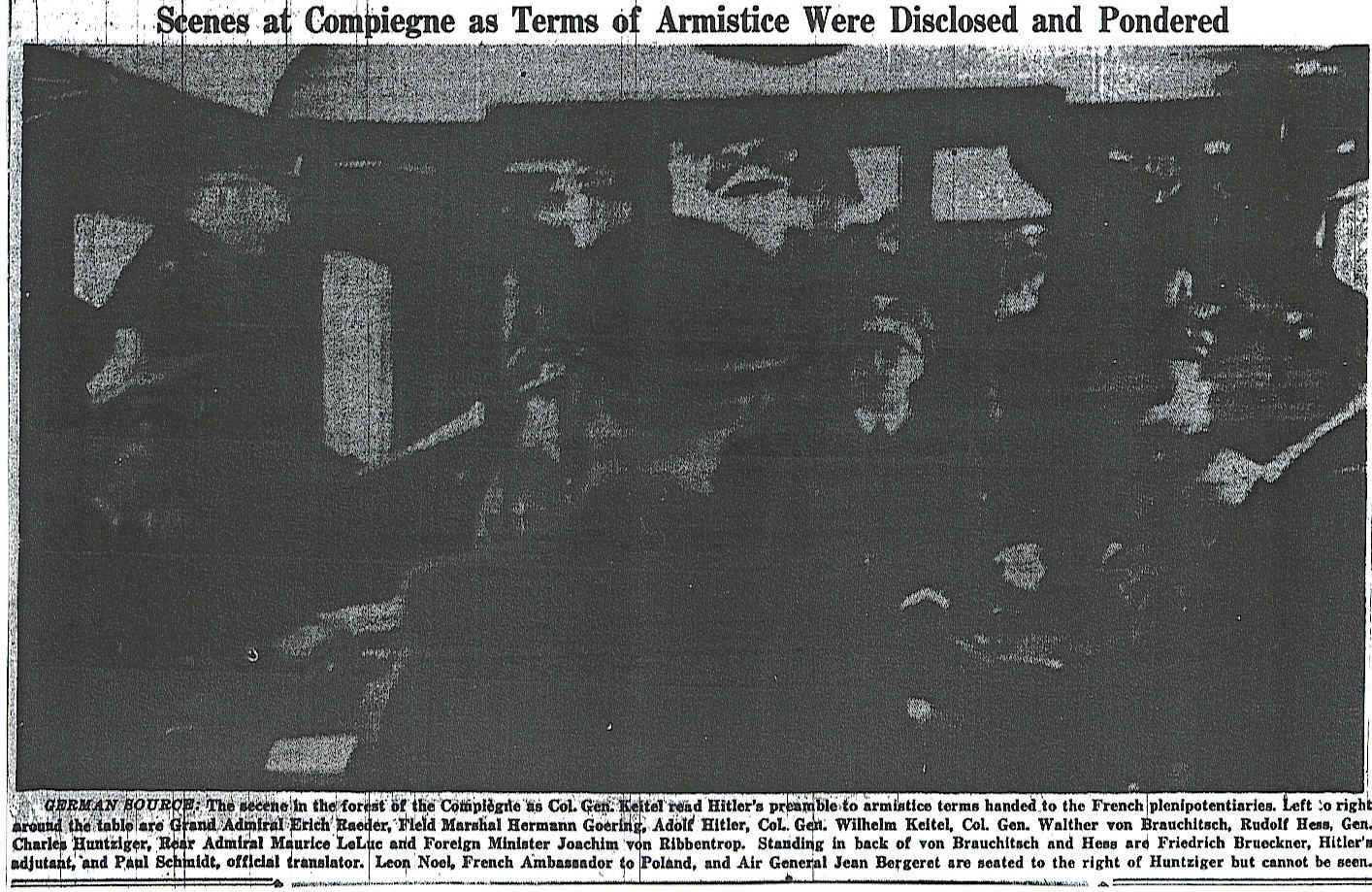
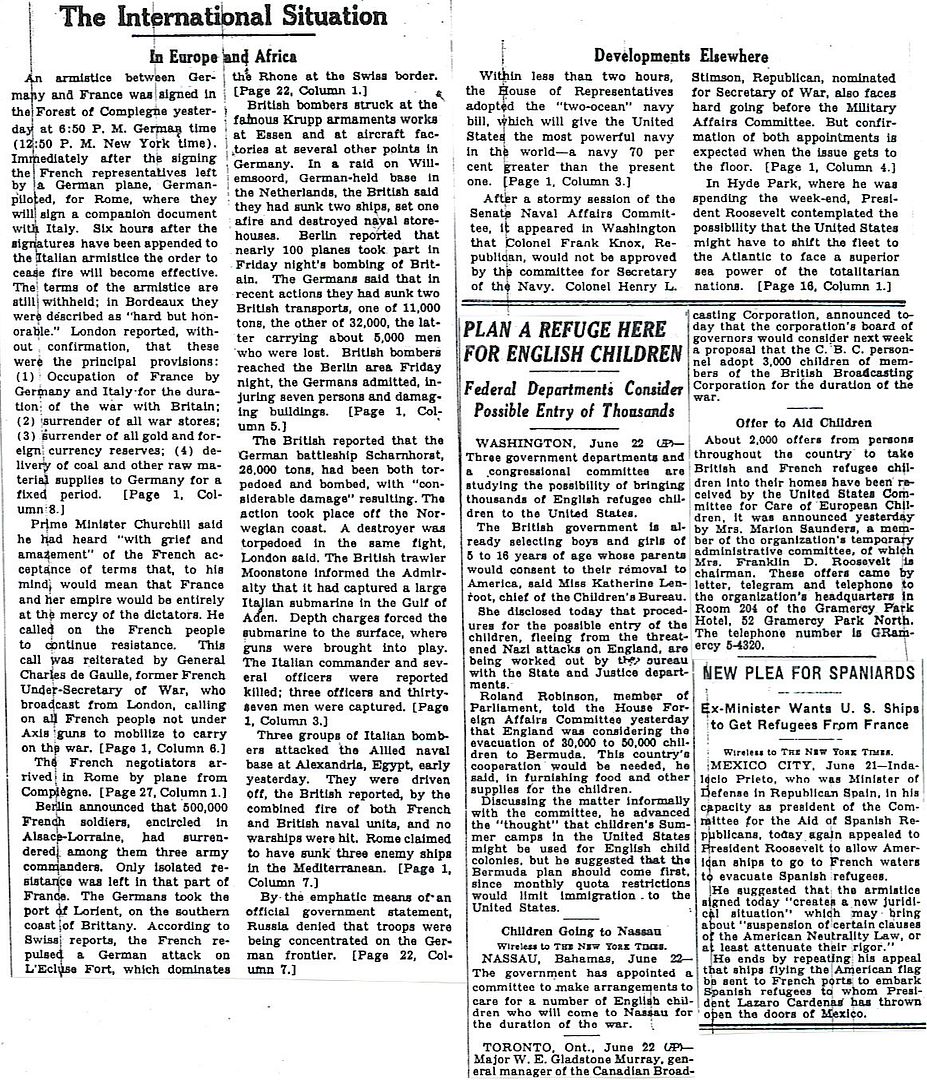
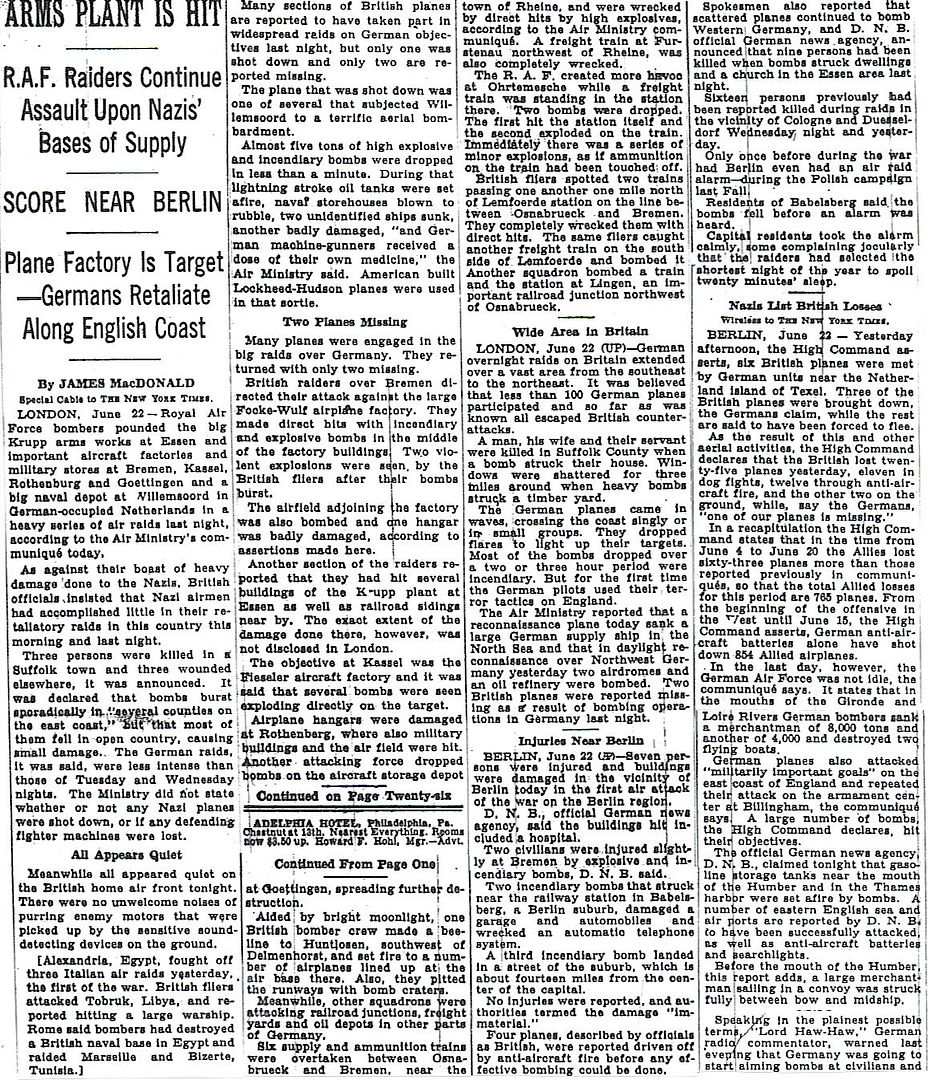
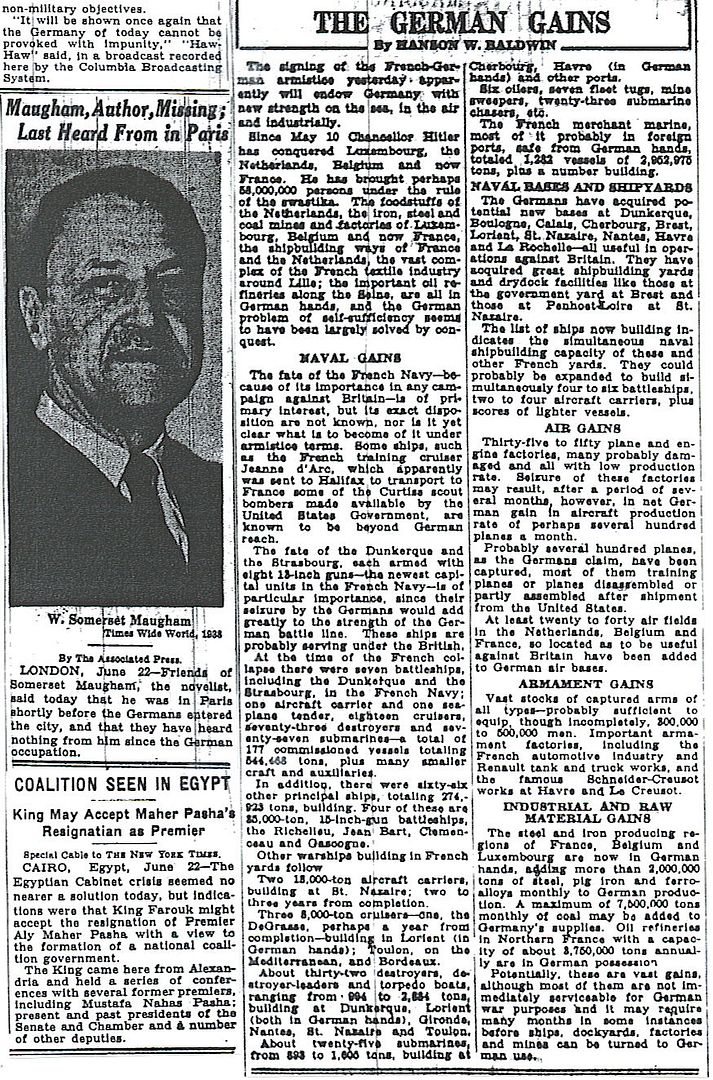
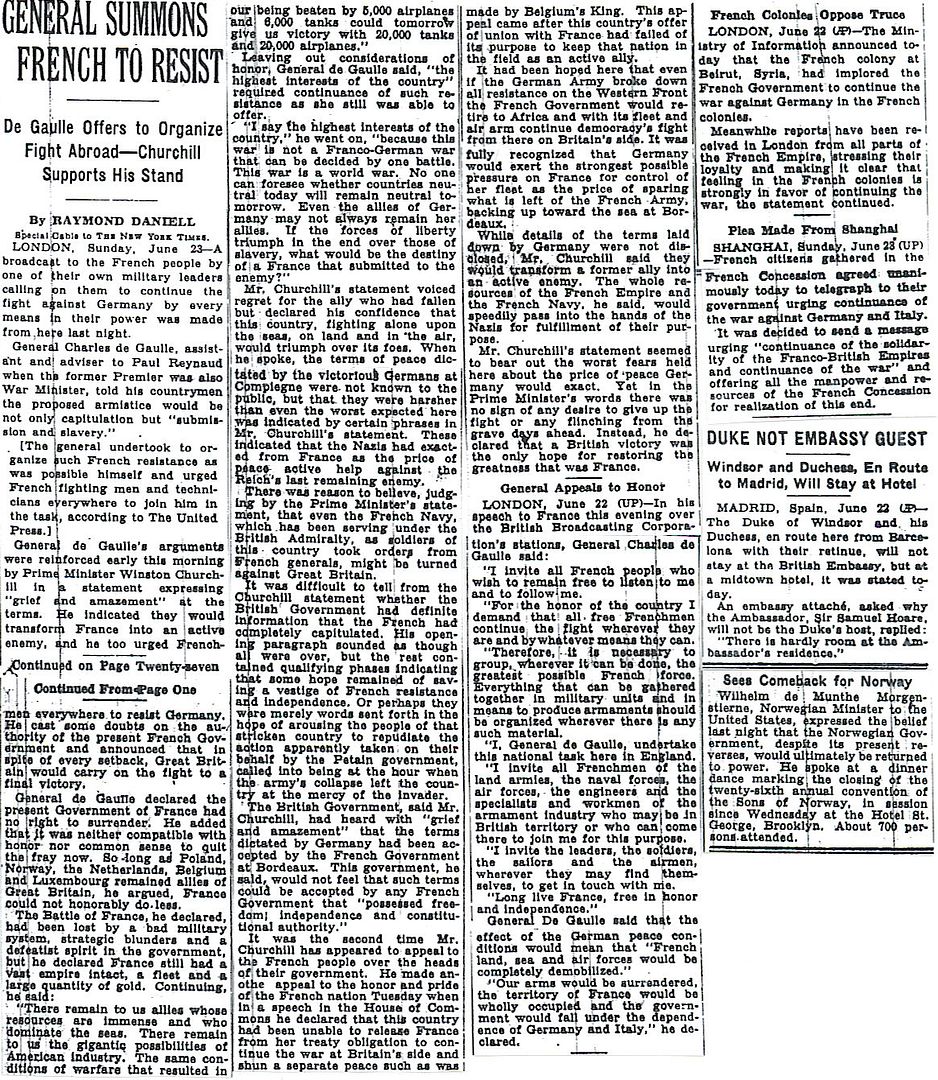
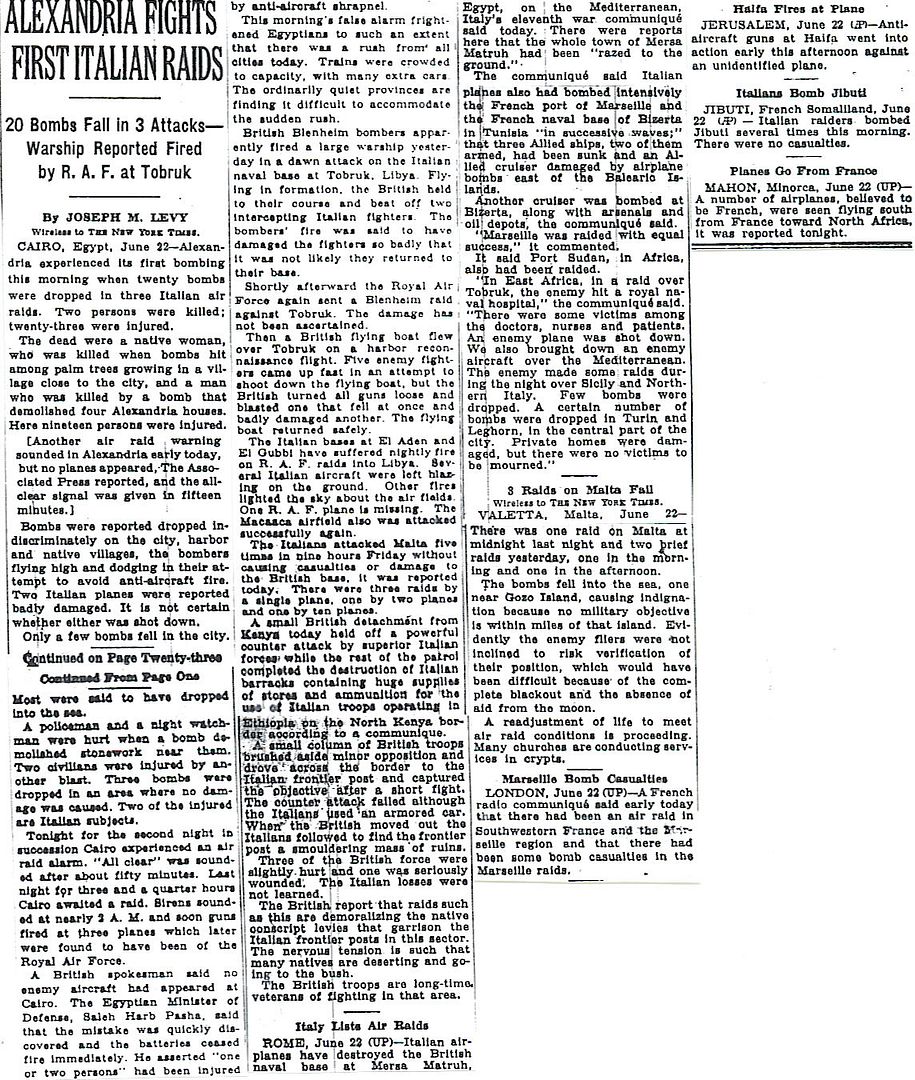
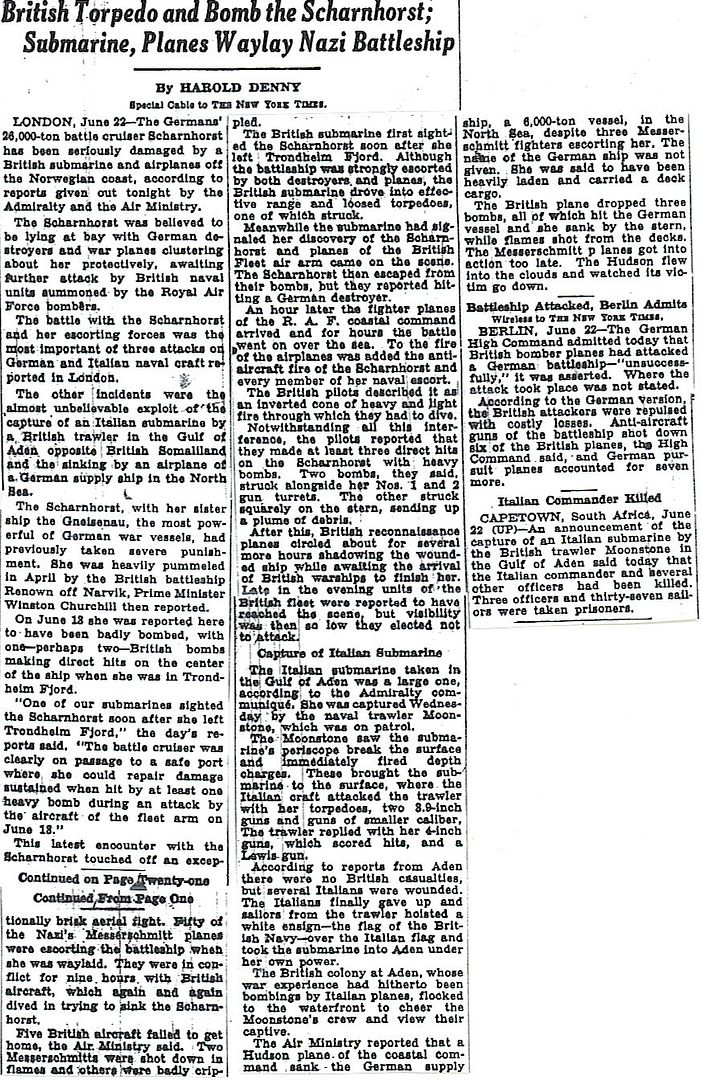
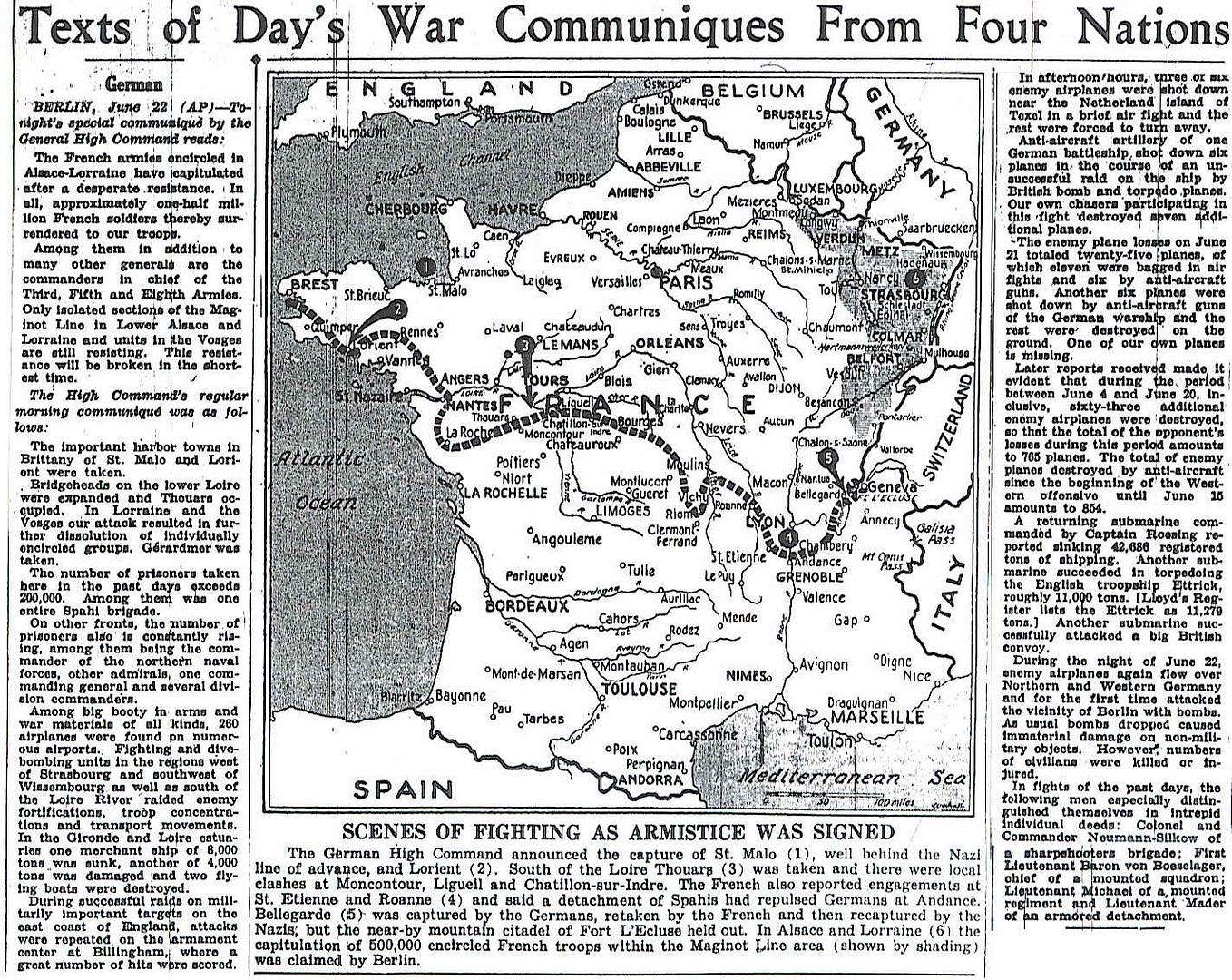
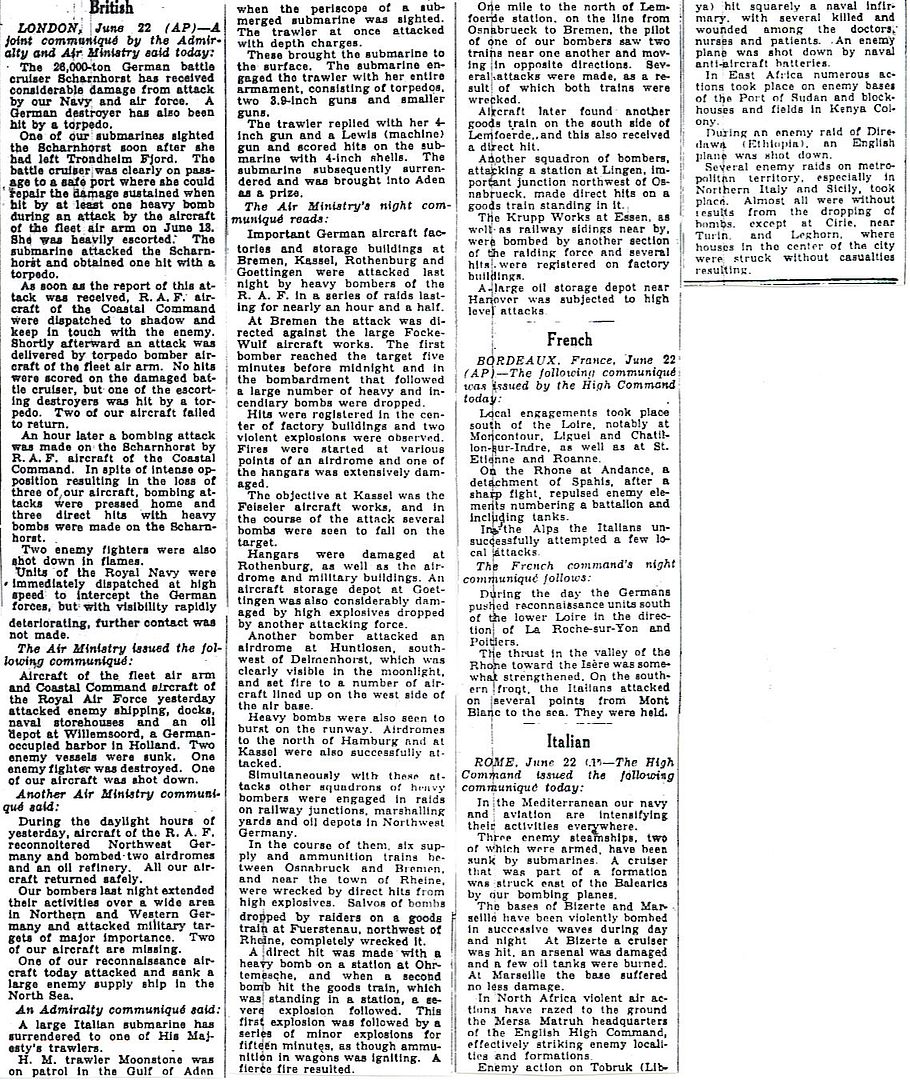
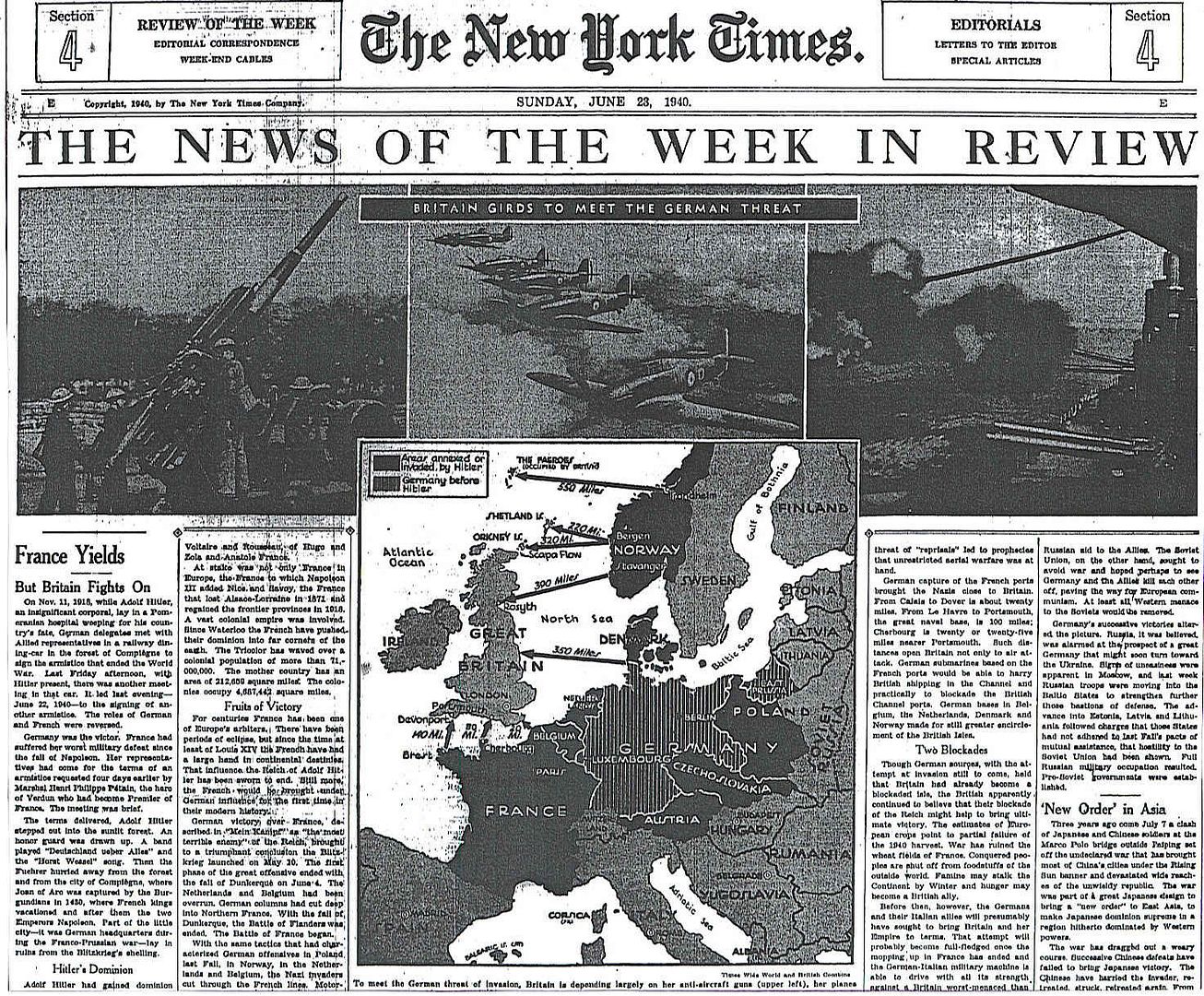
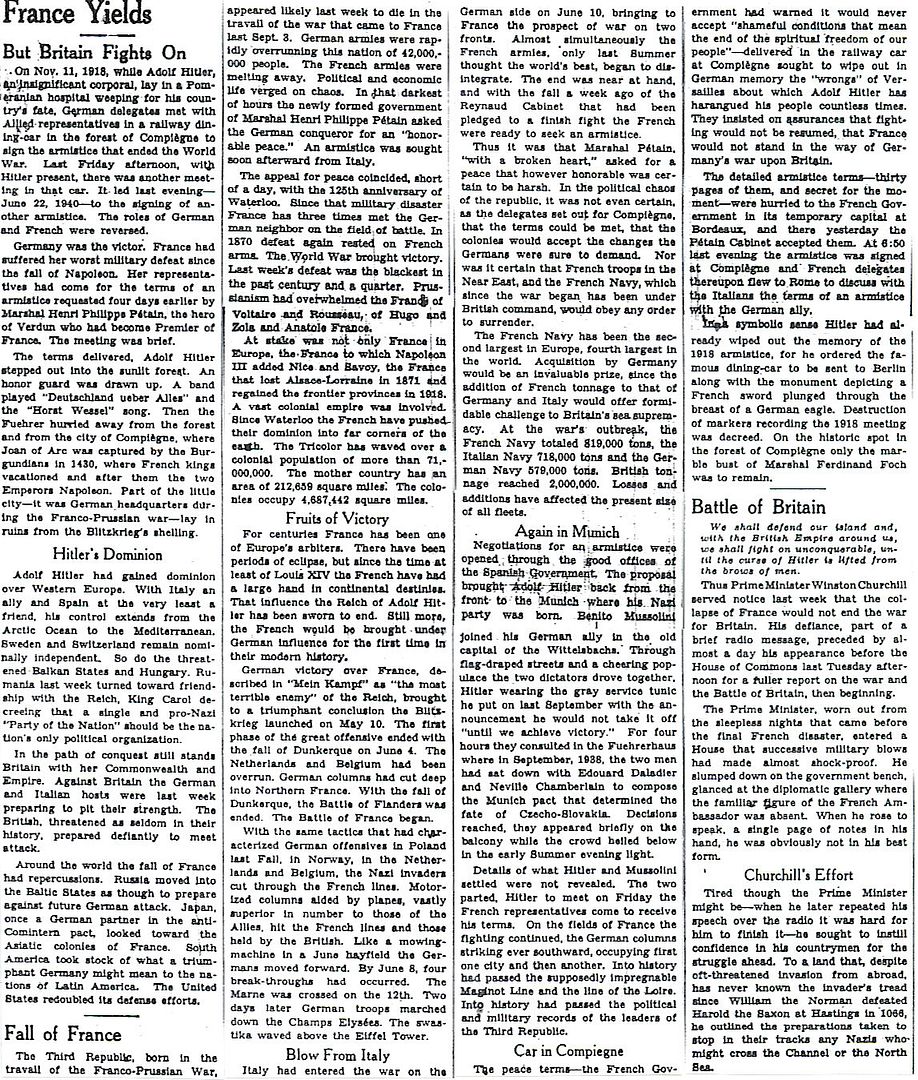
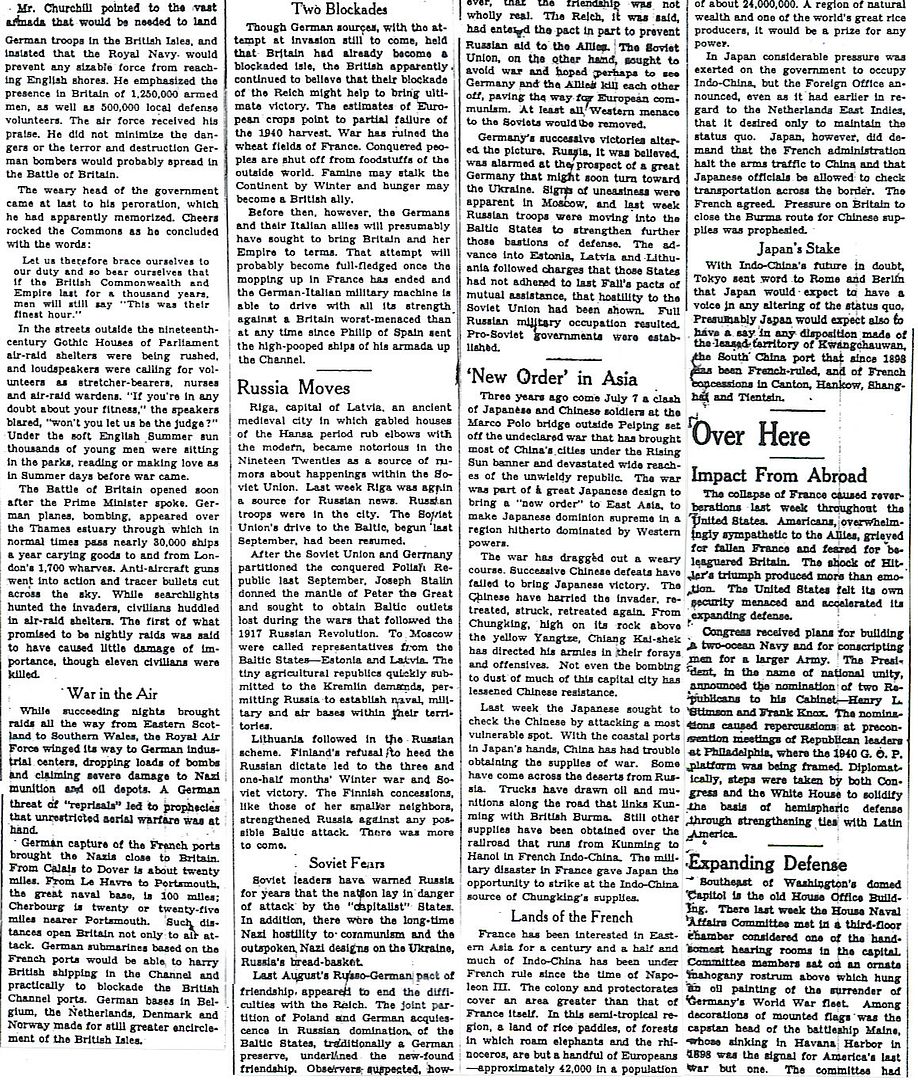
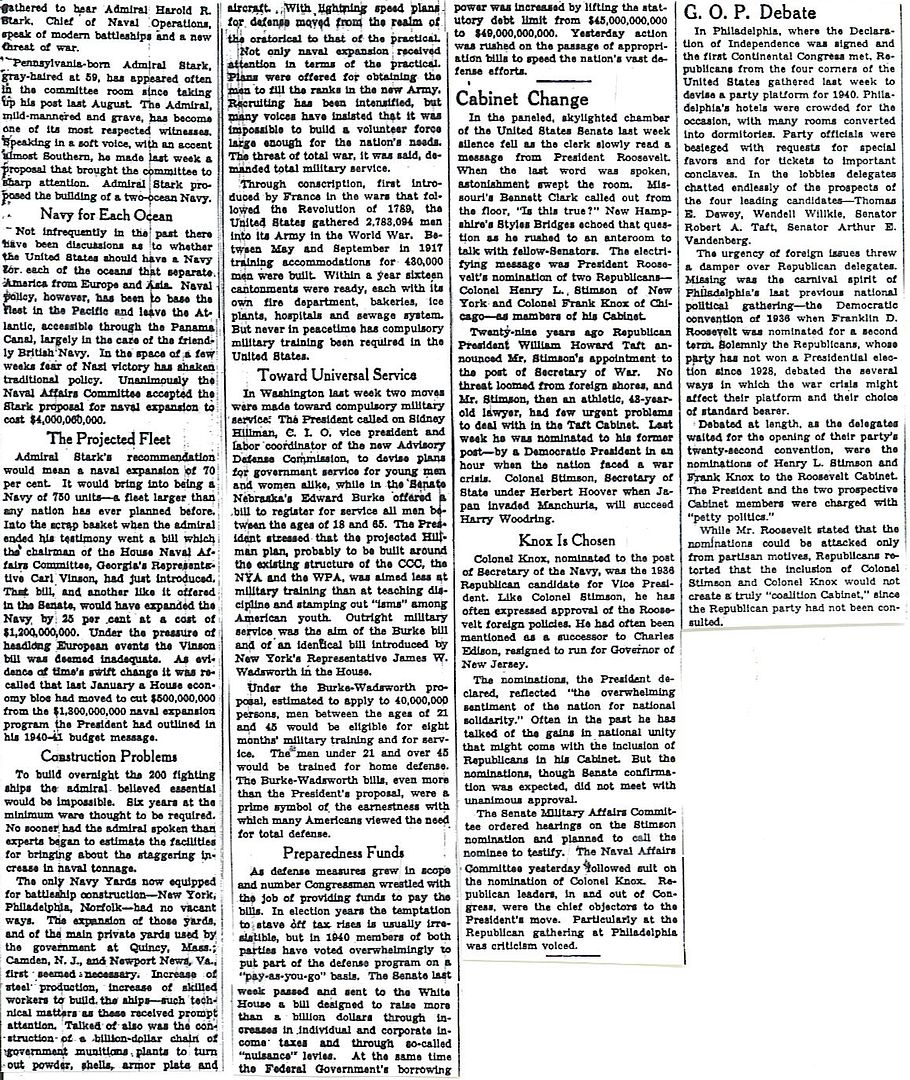
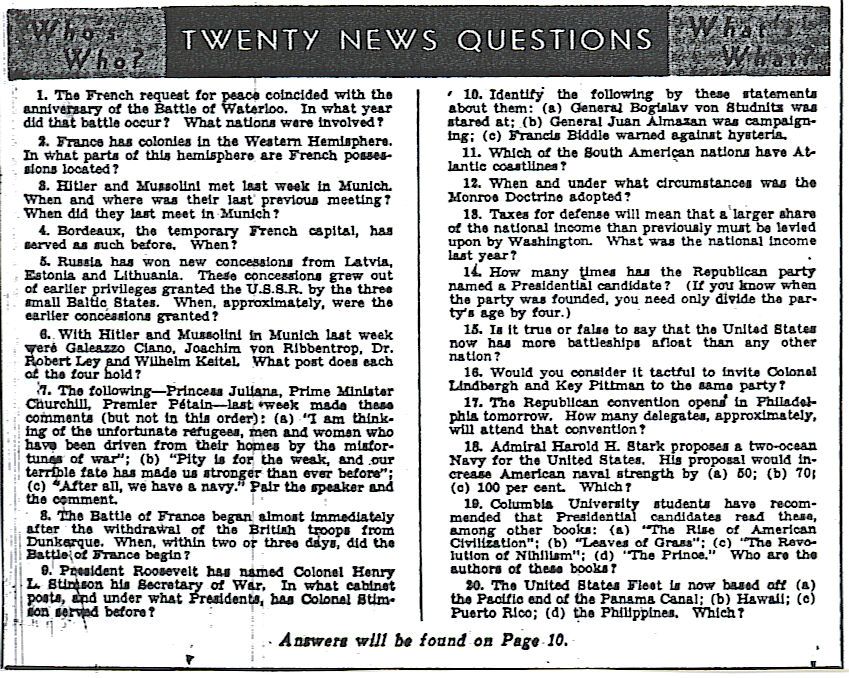
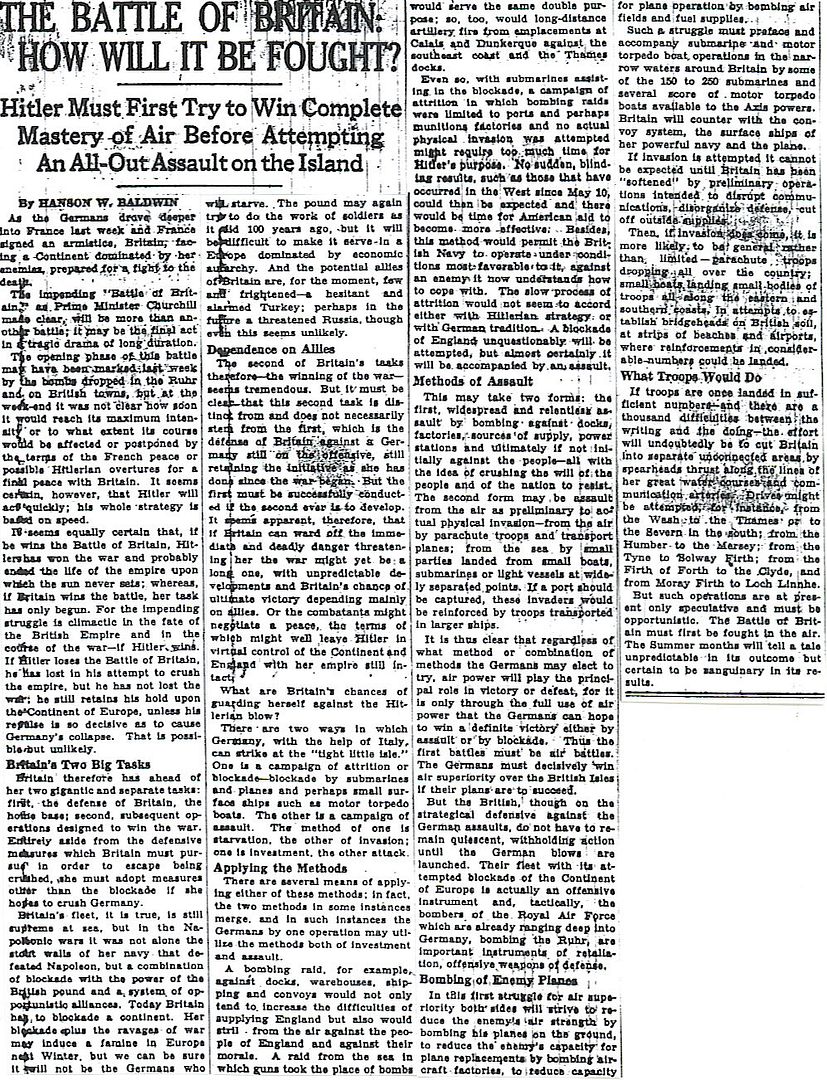
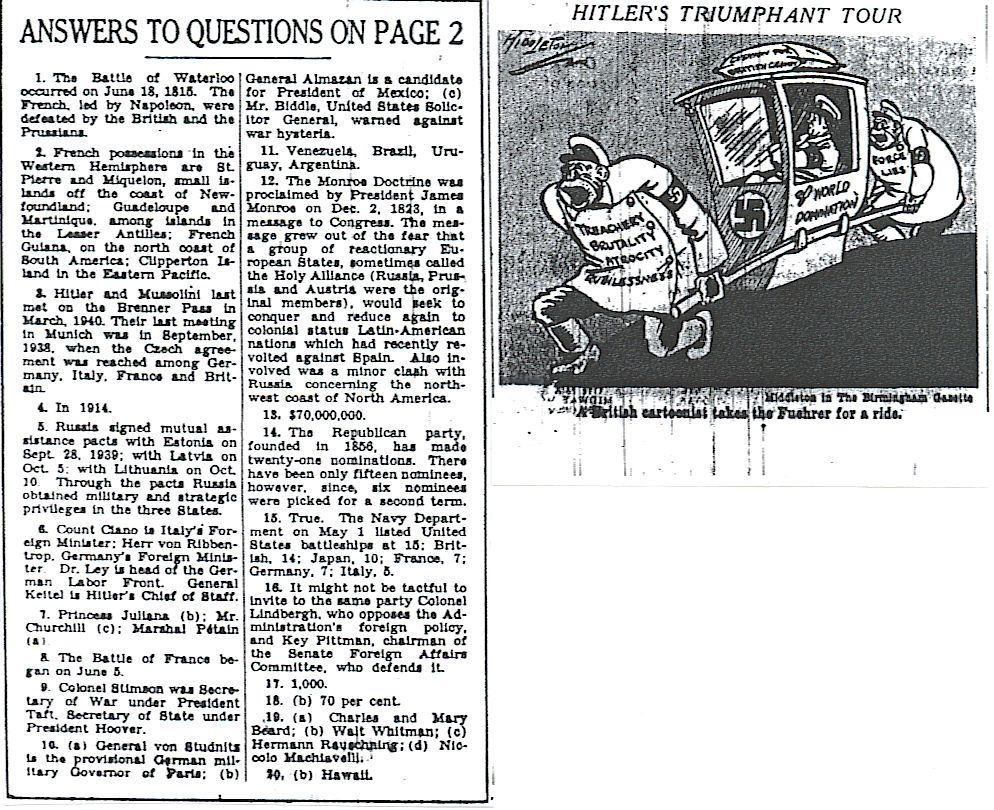
News of the Week in Review
France Yields – 14-15
Over Here – 15-16
Twenty News Question – 17
The Battle of Britain: How Will It be Fought? – 18
Answers to Twenty News Questions – 19
* Maugham looks a little like Gene Hackman
http://www.onwar.com/chrono/1940/jun40/f23jun40.htm
Pierre Laval appointed deputy PM
Sunday, June 23, 1940 www.onwar.com
In France... Pierre Laval is appointed Deputy Premier by Petain. Incidentally de Gaulle is also officially cashiered by General Weygand on this day.
http://homepage.ntlworld.com/andrew.etherington/month/thismonth/23.htm
June 23rd, 1940
UNITED KINGDOM:
RAF Bomber Command: 4 Group (Whitley). Bombing - industrial works.
10 Sqn. Eight aircraft to aluminium works Ichendorf. All bombed. Opposition severe.
51 Sqn. Ten aircraft to aluminium works Ichendorf. All bombed. Opposition severe.
58 Sqn. Eight aircraft to aluminium works Lunen and Ludwigshaven. two returned early, six bombed.
London: General Charles de Gaulle announces the formation of a French national committee.
The BBC launches its ‘Music While You Work’ programs for the war factories. They are a great success, believed to have considerably increased efficiency and therefore war production. (Antoine Capet) This program did have its moments; for example, the song “Deep in the Heart of Texas” had to be banned because all the workers would stop to clap hands at the appropriate moments. “Yes, my darling daughter” was discouraged, because of a foot-stamping sequence at the end of each verse. (Cris Whetton)
FRANCE:
Paris: Pierre Laval is appointed vice-premier of France. General de Gaulle is officially cashiered by General Weygand. de Gaulle was then sentenced to death _in absentia_, and all his possessions on French territory were confiscated. (Antoine Capet)
The first British commando raid fails to capture German guards and defence information at Bordeaux.
Paris: Hitler tours Paris accompanied by the three intellectuals he likes the best: two architects, Albert Speer and Hermann Giesler, and a sculptor, Arno Breker.
Hitler flew to Le Bourget airport at 4am, and entered the city which he said he had ordered his troops to spare “because it was important to preserve this culture for generations to come.” His visit was recorded by a photographer and a cine-cameraman. At Les Invalides he gave orders for the remains of the son of the Emperor Napoleon I to be brought from Vienna to lie next to his father. “That was the finest and greatest moment of my life.” said Hitler. At the Opera he asked the Usher, who refused a 50-mark tip to show him near-forgotten rooms which he knew of from architectural plans. Hitler boasted of his knowledge.
17 French Morane fighter planes of 1 Squadron, 1st Fighter Group and 2 Squadron, 2nd Fighter Group took off to assault the motorised units of Guderian in the Rhone valley. They found no tanks but 2nd Lt. Marchelidon of 2 Squadron shot down a German Henschel Hs126 reconnaissance plane. This was the last French kill of the campaign.
Destroyer HMCS Restigouche engaged in French evacuation operations off St Jean de Luz engaged in French evacuation operations.
ITALY: Rome: The Italian High Command announced:
‘ The Regia Aeronautica has continued its activity in the Mediterranean. It has successfully bombed the naval base at Alexandria, the present site of the British Fleet. Italian aircraft have bombed Bizerta and enemy vehicles in the eastern Mediterranean. One Italian aircraft has not returned. Our operations in North Africa have proved successful. Our aircraft took vigorous measures against armoured cars . One four-engined British aircraft was shot down. The enemy bombed the city of Trapani, but inflicted damage only on civilian dwellings. There were 20 dead and 38 wounded.’
EGYPT: Cairo: The British Middle East Air Force in Egypt announced:
‘During the night of Friday to Saturday, three Italian aircraft flying over Alexandria and its environs, dropped 20 bombs at random on the city, seaport and surrounding villages; additional bombs fell into the sea.’
INDIAN OCEAN: Off French Somaliland Italian submarine ‘Toricelli’ is sunk by destroyers HMS KANDAHAR and HMS Kingston and sloop HMS Shoreham. During this action, destroyer HMS Khartoum suffers an internal explosion and sinks in shallow water off Perim Island. She is a total loss.
Brooks Rowlett adds: This is one of those cases which isn’t really clear and may constitute an Italian success. The Italians at least partly claim it and the British don’t really acknowledge the possibility that the Italian claim is justified
This was a >surface action<. The TORICELLI exchanged gunfire with the British vessels and scored a hit on KHARTOUM, amidships, in the vicinity of the torpedo tubes. I believe it was actully after the close of the action that an air flask exploded on a torpedo in the tube. Splinters from the torpedo and tube cut into other torpedoes and tubes in the mount; the superstructure and deck, and a fire started. With the involvement of the torpedoes and their warheads, the fire became impossible to control....
The point being, that it is entirely likely that the air flask exploded because a splinter from the Italian shell hit, had penetrated the tube and torpedo and nicked the flask (with air at a few hundred PSI) which eventually ruptured with explosive force. The British have contended that it was a mere accidental coincidence.
Mike Yaklich adds: Meanwhile, on June 23rd another Italian submarine found itself involved in a dramatic surface shoot-out. The TORICELLI had been assigned to the area off the well-defended French port of Djibouti. In an encounter with Allied escorts it, too, had been damaged, leaving the vessel unable to submerge. Nonetheless, the TORICELLI’s skipper, Lt-Commander Pelosi, decided to try to run the Straits of Perim on the surface, benefiting from the cover of darkness to the greatest possible extent. In a nail-biting passage Pelosi had managed to manoeuvre the boat through the area of the thickest Royal Navy patrols during the night, but shortly after dawn on the 23rd the TORICELLI was sighted by the enemy gunboat SHOREHAM. Soon the Italian sub was being chased not only by the SHOREHAM, but also by another gunboat and three RN destroyers, the KINGSTON, KHARTOUM, and KANDAHAR. Realizing that he could not outrun his pursuers, at about 5:30 am Pelosi decided to turn and fight. The decision was virtually suicidal. The TORICELLI was another large, long-range boat, but it mounted only a single 100-mm deck gun (plus four 13.2-mm AA machineguns on two twin mounts). The five British ships chasing it had a combined firepower of eighteen 4.7-inch (120-mm) and four 4-inch guns, not to mention copious light automatic AA weapons. But the Italian sub initiated the engagement by firing the first shot. Moreover, the Italian shooting was very good. Their second 100-mm round struck the SHOREHAM, causing enough damage that the British gunboat immediately left the fight and headed back to its base. As the fight continued, the TORICELLI managed to evade some 700 shells (and about 500 rounds from the automatic AA as the vessels closed) over the course of the next 35 minutes, remaining completely unscathed by all the metal directed its way.
Meanwhile, its own gunners continued to score, now hitting the destroyer KANDAHAR, starting fires which apparently caused that ship to blow up and sink shortly after the conclusion of this spirited little engagement. The Italian sub also managed to empty all eight of its torpedo tubes, not hitting anything but forcing the enemy vessels to take evasive action, and further postponing the inevitable. That inevitable moment finally came, a little less than forty minutes into the fight, when a British shell struck square on the TORICELLI’s conning tower. Lt-Commander Pelosi was wounded, although he continued to direct his sub’s actions, but more importantly the TORICELLI’s steering was knocked out, leaving the boat out of control. At this point the plucky Pelosi gave the order to abandon ship, and the TORICELLI was scuttled. Most of his crew was picked up by the British and taken back to Aden as prisoners, where the British officers who had been present expressed their admiration for the courageous and effective Italian fight against long odds. They feted Pelosi at a testimonial dinner, and the British admiral commanding at Aden insisted on meeting the Italian sub-driver personally.
Sloop HMS Pathan is torpedoed and sunk by Italian submarine Galvani in the Indian Ocean off Bombay at 18 56N 72 45E. 5 of the crew are killed and 22 are wounded. It had not been thought that Axis submarines operated so far to the East. (Galvani is rammed and sunk by HMS Falmouth on the following day.) (Alex Gordon)(108)
CANADA: Sgt. Henry A. Larsen leaves Vancouver on the RCMP schooner St. Roch bound for Halifax via the Northwest Passage; ship will take southerly route through Arctic islands, and after two winters trapped in the ice, will reach Halifax Oct. 11, 1942; first ship to make the voyage from west to east, and in both directions, and to circumnavigate North America; St. Roch declared national historic site in 1962; berthed at Vancouver Maritime Museum.
Armed yacht HMCS Vison departed Halifax for conversion and arming Pictou Nova Scotia. (Dave Shirlaw)
ATLANTIC OCEAN: Rescue tug HMS Coringa lost in North Atlantic due to unknown reasons. (Dave Shirlaw)
http://worldwar2daybyday.blogspot.com/
Day 297 June 23, 1940
Hitler makes a triumphant entrance into Paris and does some sightseeing. It will be his only visit to Paris. Despite the Franco-German agreement, cessation of hostilities in France depends on negotiation of a separate armistice with Italy. The French delegation leaves for Rome, including General Huntzinger who just signed the Franco-German agreement at Compiègne.
Using information from Italian submarine Galileo Galilei captured on June 19, British sloop HMS Shoreham locates Italian submarine Evangelista Torricelli and forces her to the surface with depth charges. Evangelista Torricelli bravely engages 3 British destroyers HMS Kandahar, Kingston and Khartoum with her deck gun but is sunk near Perim Island at the mouth of the Red Sea. Later, HMS Khartoum is badly damaged when one of her own torpedoes explodes on deck (1 dead). Khartoum is beached on Perim Island to prevent sinking, but she is a total loss and is never repaired. http://www.naval-history.net/xGM-Chrono-10DD-39K-Khartoum.htm
Charles de Gaulle is officially cashiered from the French Army by defeated French Commander in Chief General Weygand, although he will continue to use the title of General de Gaulle as leader of the Free French.
Suffering further friendly fire, U-99 is bombed twice returning from Bergen to Wilhelmshaven causing only minor damage.
De Gaulle speeches:
http://www.guardian.co.uk/theguardian/2007/apr/29/greatspeeches1
“”
June 19 1940
Frenchmen must now be fully aware that all ordinary forms of authority have disappeared.
Faced by the bewilderment of my countrymen, by the disintegration of a government in thrall to the enemy, by the fact that the institutions of my country are incapable, at the moment, of functioning, I, General de Gaulle, a French soldier and military leader, realise that I now speak for France. I n the name of France, I make the following solemn declaration: It is the bounden duty of all Frenchmen who still bear arms to continue the struggle. For them to lay down their arms, to evacuate any position of military importance, or agree to hand over any part of French territory, however small, to enemy control, would be a crime against our country. For the moment I refer particularly to French North Africa - to the integrity of French North Africa.
The Italian armistice is nothing but a clumsy trap. In the Africa of Clauzel, Bugeaud, Lyautey, and Noguès, honour and duty strictly enjoin that the French should refuse to carry out the conditions imposed by the enemy.
The thought that the panic of Bordeaux could make itself felt across the sea is not to be borne.
Soldiers of France, wherever you may be, arise!
June 22 1940
The French government, after having asked for an armistice, now knows the conditions dictated by the enemy.
The result of these conditions would be the complete demobilisation of the French land, sea, and air forces, the surrender of our weapons and the total occupation of French territory. The French government would come under German and Italian tutelage.
It may therefore be said that this armistice would not only be a capitulation, but that it would also reduce the country to slavery. Now, a great many Frenchmen refuse to accept either capitulation or slavery, for reasons which are called: honour, common sense, and the higher interests of the country.
I say honour, for France has undertaken not to lay down arms save in agreement with her allies. As long as the allies continue the war, her government has no right to surrender to the enemy. The Polish, Norwegian, Belgian, Netherlands, and Luxemburg governments, though driven from their territories, have thus interpreted their duty. I say common sense, for it is absurd to consider the struggle as lost. True, we have suffered a major defeat. We lost the battle of France through a faulty military system, mistakes in the conduct of operations, and the defeatist spirit shown by the government during recent battles. But we still have a vast empire, our fleet is intact, and we possess large sums in gold. We still have the gigantic potentialities of American industry. The same war conditions which caused us to be beaten by 5,000 planes and 6,000 tanks can tomorrow bring victory by means of 20,000 tanks and 20,000 planes.
I say the higher interests of the country, for this is not a Franco-German war to be decided by a single battle. This is a world war. No one can foresee whether the neutral countries of today will not be at war tomorrow, or whether Germany’s allies will always remain her allies. If the powers of freedom ultimately triumph over those of servitude, what will be the fate of a France which has submitted to the enemy?
Honour, common sense, and the interests of the country require that all free Frenchmen, wherever they be, should continue the fight as best they may.
It is therefore necessary to group the largest possible French force wherever this can be done. Everything which can be collected by way of French military elements and potentialities for armaments production must be organised wherever such elements exist.
I, General de Gaulle, am undertaking this national task here in England.
I call upon all French servicemen of the land, sea, and air forces; I call upon French engineers and skilled armaments workers who are on British soil, or have the means of getting here, to come and join me.
I call upon the leaders, together with all soldiers, sailors, and airmen of the French land, sea, and air forces, wherever they may now be, to get in touch with me.
I call upon all Frenchmen who want to remain free to listen to my voice and follow me.
Long live free France in honour and independence!””
Does this possibly explain why de Gaulle was always considered a bit "difficult"?
Maybe that death sentence made him just a bit, er, "grumpy"? ;-)
Disclaimer: Opinions posted on Free Republic are those of the individual posters and do not necessarily represent the opinion of Free Republic or its management. All materials posted herein are protected by copyright law and the exemption for fair use of copyrighted works.